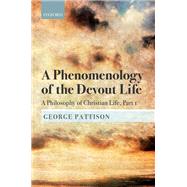A Phenomenology of the Devout Life A Philosophy of Christian Life, Part I
, by Pattison, George- ISBN: 9780198813507 | 0198813503
- Cover: Hardcover
- Copyright: 12/25/2018
A Phenomenology of the Devout Life is the first part of a three-part work, A Philosophy of Christian Life. Rather than approaching Christianity through its doctrinal statements, as philosophers of religion have often done, the book starts by offering a phenomenological description of the devout life as that is set out in the teaching of Francois de Sales and related authors. This is because for most Christians practice and life-commitments are more fundamental than formal doctrinal beliefs. Although George Pattison will address the metaphysical truth-claims of Christianity in Part three, the guiding argument is that it is the Christian way of life that best reveals what these beliefs really are. As the work is a philosophical study, it does not presuppose the truth of Christianity but assumes only that there is a humanly accessible meaning to the intention to live a devout life, pleasing to God. This can be said to find expression in a certain view of selfhood that emphasizes the dimensions of feeling and will rather than intellect and that culminates in the experience of the annihilation of self. This is a model of selfhood deeply opposed to contemporary models that privilege autonomous agency and the devout life is therefore presented as offering a corrective to extreme versions of the contemporary view.






